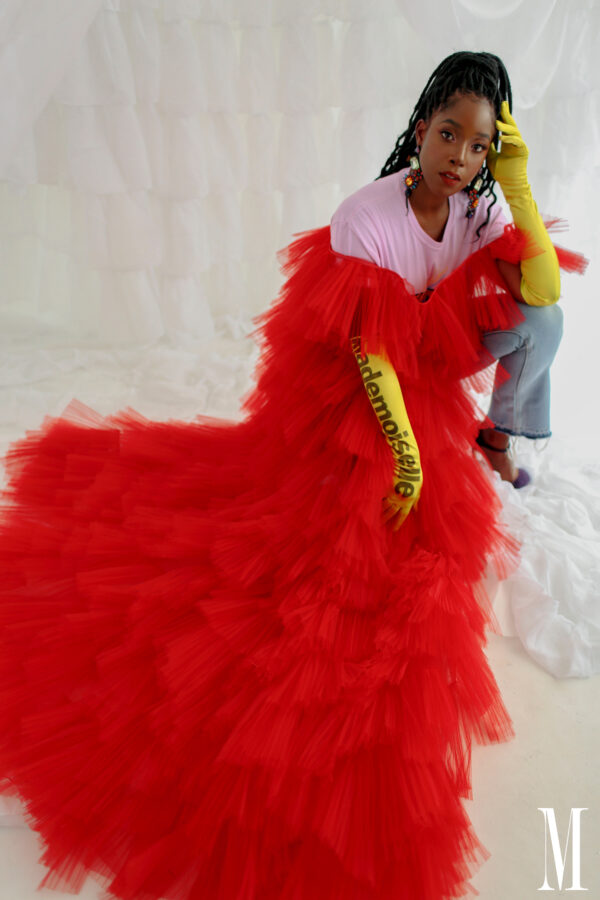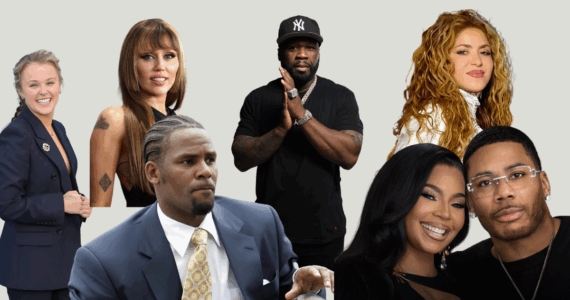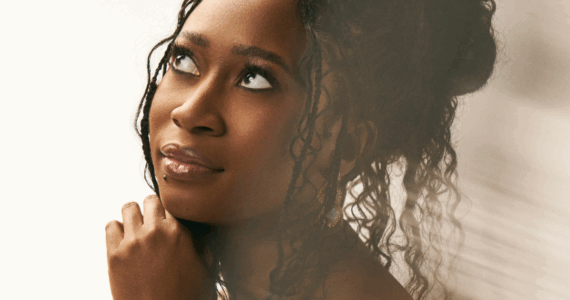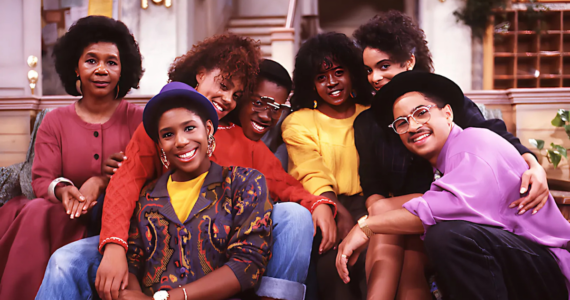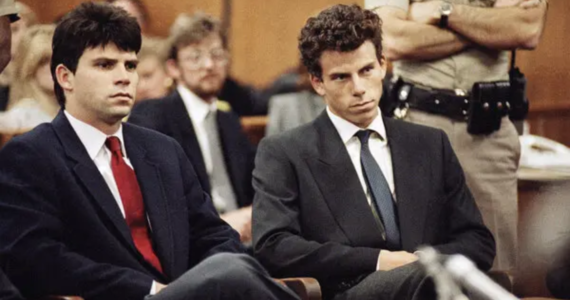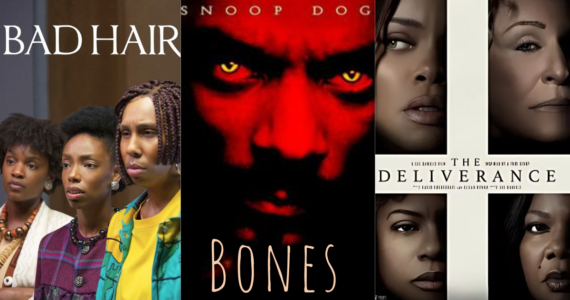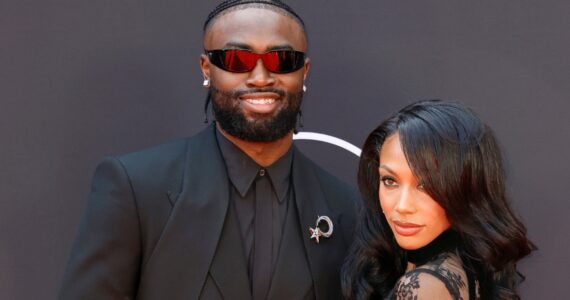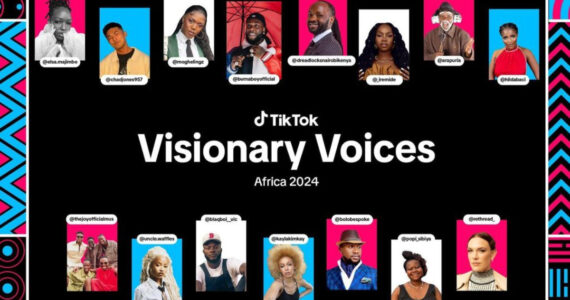Ashley Blaine Featherson is a person the world needs to know. She’s a lover of Caribbean cuisine. She’s a member of the sorority Alpha Kappa Alpha Incorporated and has a dog named Diva that she adores. However, more importantly, she is an unapologetic brown skinned girl who plays the equally unapologetic Joelle on Netflix’s ‘Dear White People’. The Netflix series is getting ready to air Volume 3 this Friday, and Featherson has promised fans will get to see and hear more of the criminally underrated character.
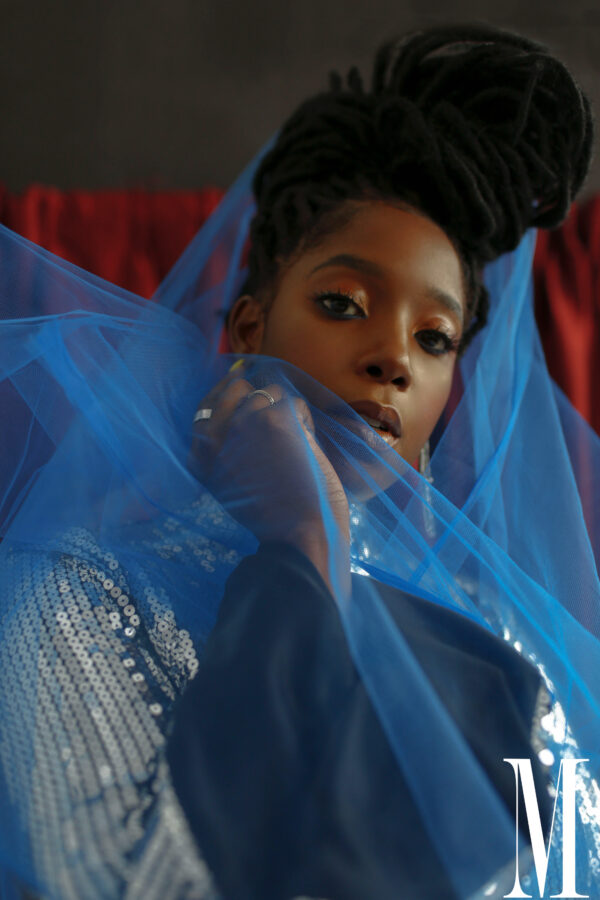
Rings| Left Hand| Clear Ring| Lady Grey Pearl Ring| Chris Habana
Right Hand| Band| Stylist Owned | multi-band ring | Chris Habana
As much as fans want to know more about Joelle, they also want to know more about the woman who portrays her, who in her words is an enigma. The Howard University alum got candid with us about the new season of Dear White People, her defining moments, treatment of dark-skinned women in the entertainment industry, and who she is as a person.
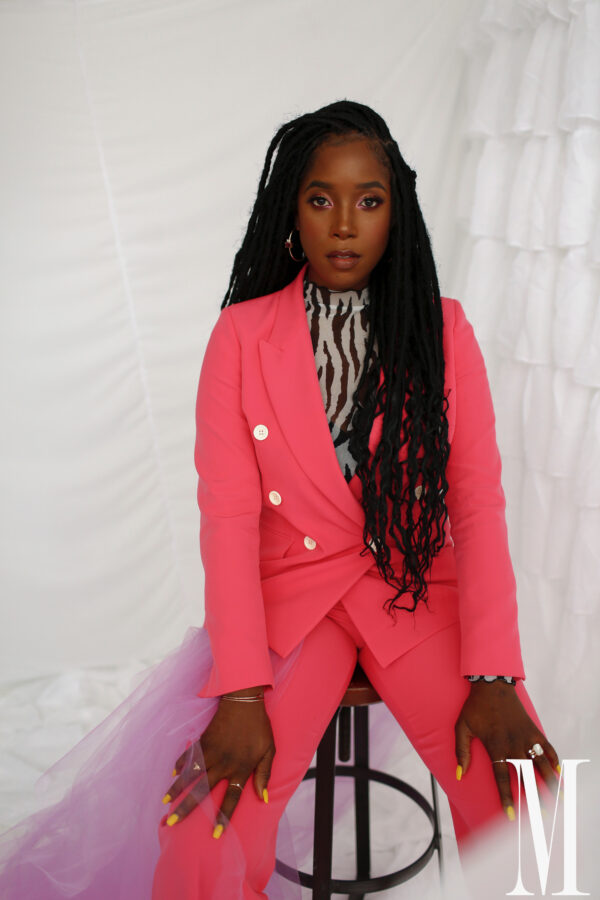
The Beginning
Featherson has always been a creative child. Since the age of 3, she has been enrolled in performing arts classes. At age 14 she began her ascent into the world of professional acting, choosing to attend Howard University 3 years later to study musical theater. After she received her degree, she moved to Los Angeles 8 months later. It was in 2014 where she landed her first featured film role in Dear White People, and later reprised her role as supporting character Joelle in the Netflix series.

What can people expect from this season of Dear White People and from Joelle?
“There is even more mystery this season! You see characters really try to figure out what’s right and what’s wrong for them morally. You see characters dealing with their morals, which I think is really interesting and wonderful. A lot of times you don’t see characters on television really grappling with who they are. I think what’s really special about that is when I think about my time in college, it probably was the most influential time in my life. It was at Howard where I became who I am today, and where I made the decision of the type of woman I want to be. You see that the characters are doing that this season and it’s really powerful.”
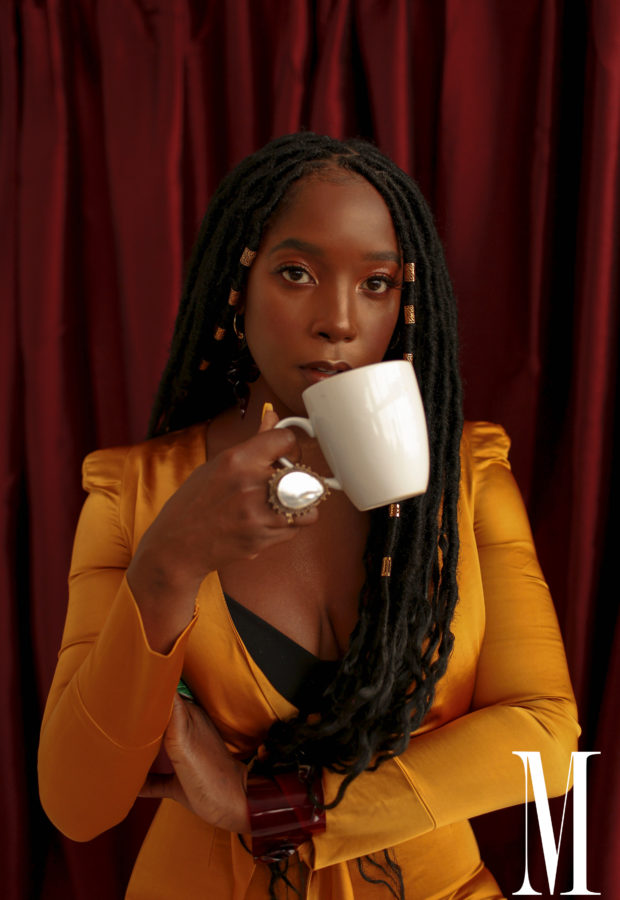
Earrings| Lady Grey | Mega Mega Projects Cuff| Lady Grey| Mega Mega Projects
Season 3 of the show starts off with Joelle’s voice being heard on the radio station, which is a change from season 1 where Logan Laurice’s character, Sam was the opening voice with Joelle in the background. This season also explores the newfound relationship and struggles between Joelle and Reggie. Viewers are curious to see if the two will be able to make it work in spite of their pasts.
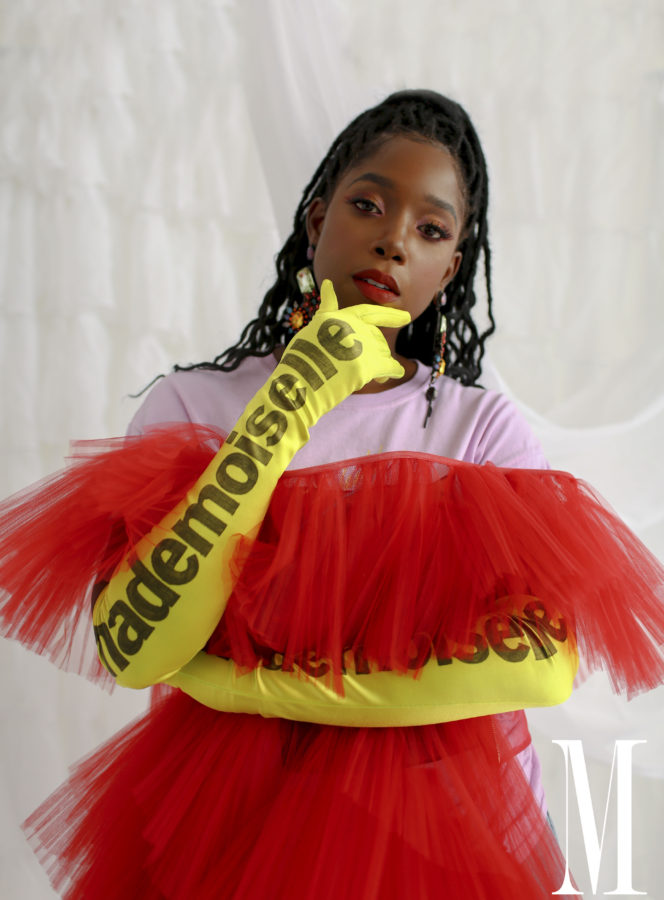
“Joelle is, I like to say a lot of the times, the voice of the audience. Joelle is saying things on the show that people are thinking when they’re watching the show. She’s very levelheaded, she’s very inquisitive, and she’s also very real. You see some real raw moments with Joelle.”
People will also get to see more of who Joelle is this season separate of Sam.
“You also get to see Joelle out of Sam’s shadow a little bit more. That’s always been something that we’ve tackled in the show “who is Joelle outside of Sam and who is Sam outside of Joelle.”
“I think a lot of people deal with that; you have to find yourself outside of the shadow of your closest friends. I think this season for Joelle is a payoff for a certain audience. I think that you get a lot from Joelle that you’ve been wanting and hoping you can see from season 1.”
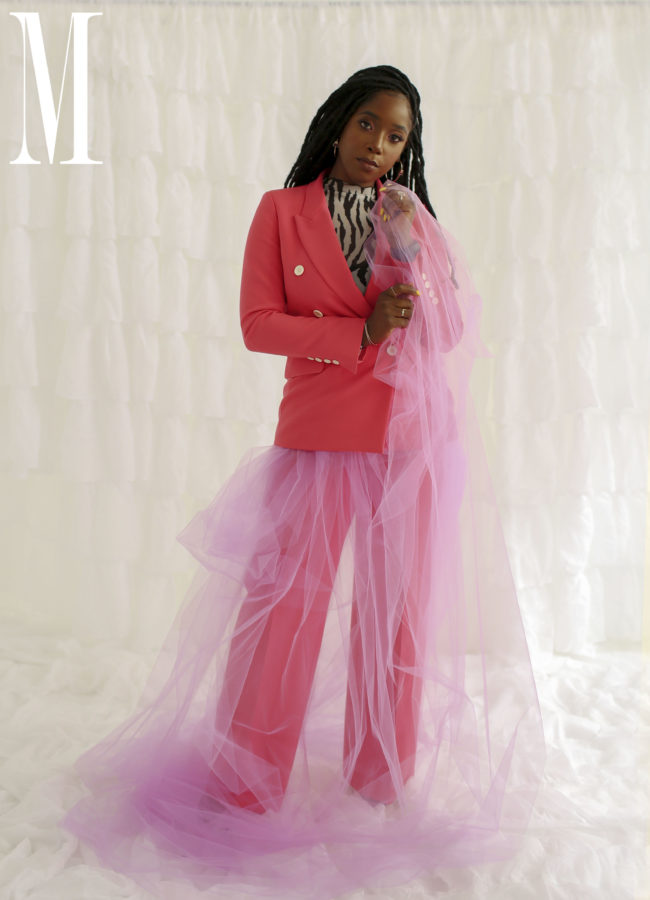
What kind of topics will Dear White People touch on this season?
“We’re still talking about race relations, we’ll never stop talking about that. We’re tackling love. We’re tackling sexuality. We’re tackling sexual abuse and/or allegations and what that looks like at a university. We’re tackling Journalism in a really raw and important way. We’re tackling what might a Dear Black People look like. There’s nothing we don’t tackle, to be honest.”
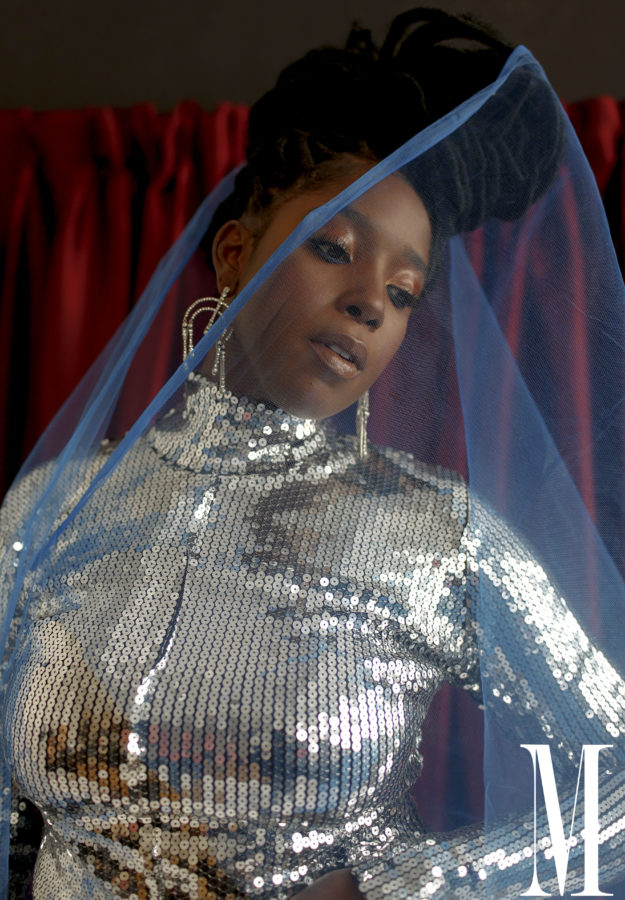
Rings| Left Hand| Clear Ring| Lady Grey Pearl Ring| Chris Habana
Right Hand| Band| Stylist Owned | multi-band ring | Chris Habana
What sets Dear White People apart from other shows?
“Everything! I think that to me ‘Dear White People’ is such a unique and nuanced show. The show that it reminds me of the most is ‘A Different World,’ but even ‘A Different World’ is so different from that too. ‘A Different World’ was in the 80s it’s 2019, so it’s been a long time. I think that on ‘Dear White People’ we’re telling stories that a lot of people are afraid to tell. We’re talking about things in a way that people shy away from. From the lighting to the acting, to the directing, to the costumes, to the set design, we’re unapologetic in everything! As people are shying away from talking about issues of race, racial politics, and racial divides and tensions that universities or whatever it may be, we’re leaning into that. We’re leaning into that as much as it can because it’s needed right now.”
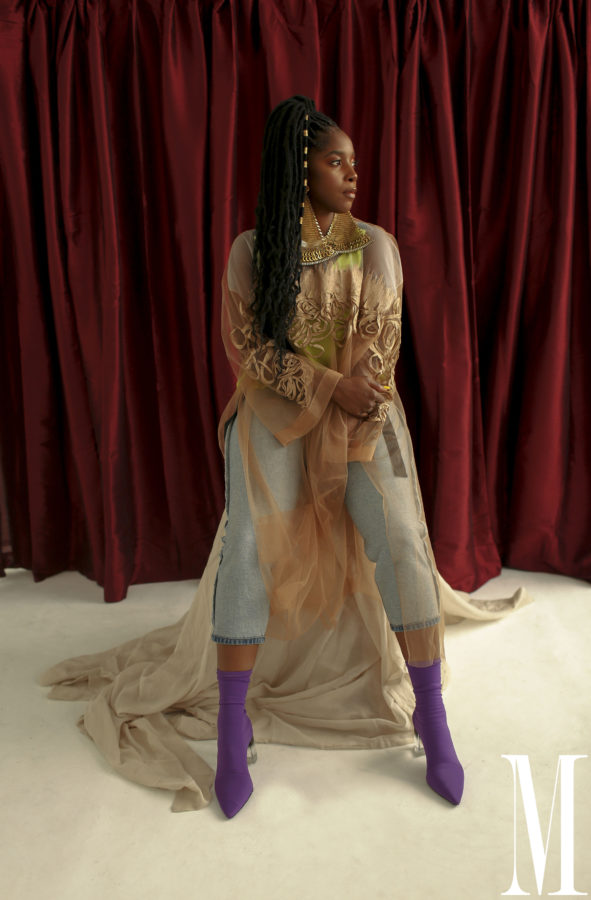
Have your views on life and social justice changed since season 1?
“1,000 percent! I think the biggest change is that I take great pride in being able to be on a show that, one is so important for the culture and, two is dedicated to advocating for people of color. I think because I’m on a show that’s my job, I make sure that is also a priority in my life. Not that it wasn’t before, but it has added to that level of responsibility that I too make sure that in everything that I do whether in ‘Dear White People’ or beyond, that I’m dedicated to serving people of color. We deserve it and we get so little of it. Whatever my little contributions to the world are I’m making sure that they’re dedicated to us.”
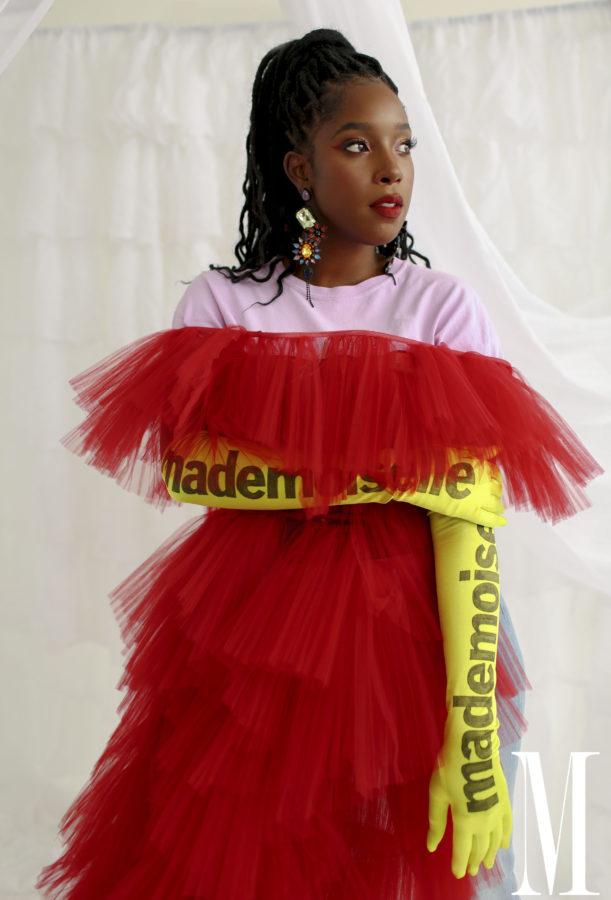
What college moment defined you?
“I’m a member of Alpha Kappa Alpha Sorority Incorporated, and it was a really beautiful and memorable experience. I have these wonderful line sisters who are lifelong friends of mine, and just going through being a part of a divine 9 sorority and being Alpha chapter and coming from the first chapter at Howard University is just really a beautiful experience. It was an experience at the time that was very poignant, but now being 12 years removed from that it’s even more powerful today.”
Like many people, there is always that one teacher that inspires their students and teaches them something that they carry with them for the rest of their lives. Howard professor Henrietta Edmond taught Featherson the concept of “business show”, which is something she references to this day.
“We have to make sure we are running our careers like a business. That’s always stuck with me because I think that sometimes people get so consumed in the artistry, but forget that this is a business. What it left me with is that I don’t have to sacrifice one for the other; I can still be completely dedicated to my artistry while still remembering that it’s a business.”
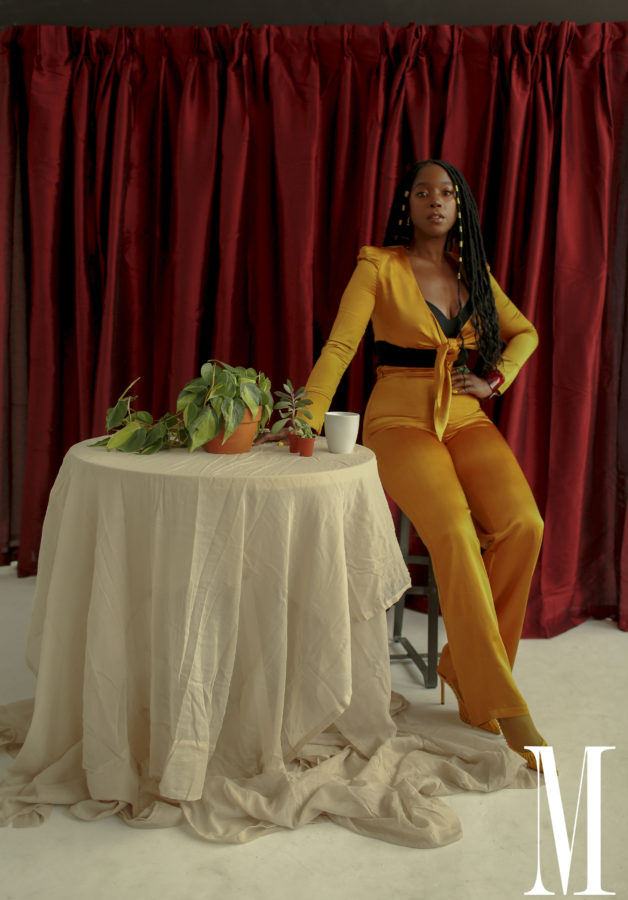
Rings| Stylist Owned Earrings| Lady Grey | Mega Mega Projects
Cuff| Lady Grey| Mega Mega Projects
What roles do you want to see darker-skinned women portray? Why do you think there is a lack of dark skin women being cast in lead roles?
“I just want us to always be able to be real women. I take issue with darker-skinned women at times not having the same opportunities to be beautiful wives and mothers onscreen. Why is that a thing? It’s not anything specific, it’s just I walk around the world like a normal 31- year-old woman that loves life. I want to see women that look like me continuously doing that onscreen. That’s it! I will be grateful for the day that it won’t seem like a huge risk. It shouldn’t be a huge win that all these articles are written about. It should feel like a mainstay that’s very normal in entertainment.”
Featherson states that the parallels surrounding dark-skinned women can be dated back to the Jim Crow era.
“I think the reason why {it’s parallels} is that I still think this country specifically, and the world is dealing with not feeling as though, at times, that darker or richer skinned women are as valuable or as beautiful. Unfortunately, that’s how our country was founded. That’s what Jim Crow was all about. That’s all that people know, and it takes dedication not to be that way and not to view darker or richer skin women that way and see us like everybody else. Because we are. I don’t think we’re viewed as valuable, as desirable, or as beautiful.”
What was your reaction to Beyonce’s song ‘Brown Skin Girl?’
“It took me out, I was listening to the album randomly. I was in my car and I was like let me listen to this. I saw a couple of people posting it online and I was like, oh let me listen to this song. I saw the title but I didn’t know that it was going to make me feel the way it did. It was more than a song. To me, it permeated me like a love letter. It almost resonated with me in a spiritual way.”
Beyonce’s song ‘Brown Skin Girl’ has become a fan favorite because it celebrates the beauty of dark-skinned girls. Featherson couldn’t help herself from getting emotional when she heard the song. For the actress, the song was so moving, it reminded her of a negro spiritual song. Uplifting and beautiful. Although the song was not needed for her, it was greatly appreciated.
“Why would Beyonce, a black woman, writing a song so beautiful and eloquently called ‘Brown Skin Girl’ make me weep? It was an acknowledgment of who I am.”
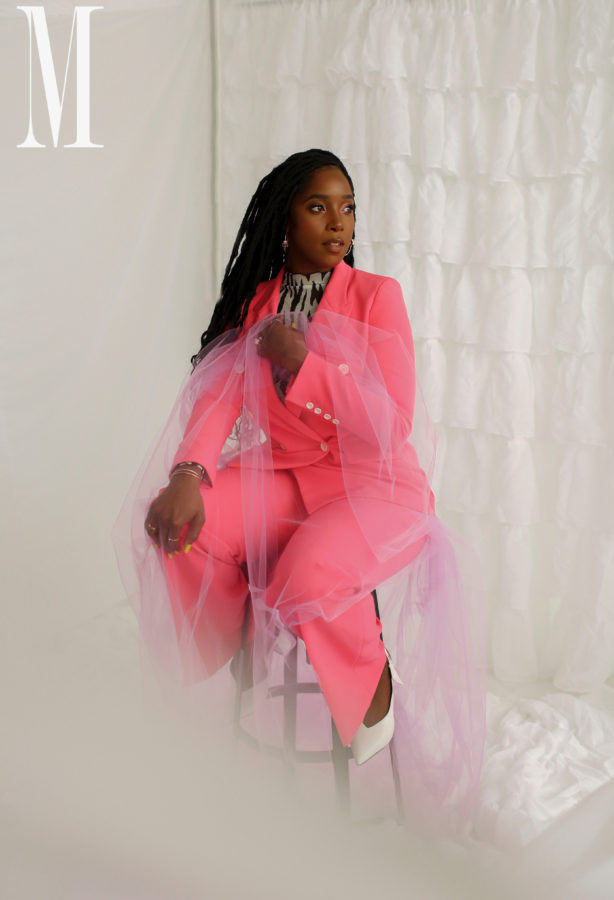
What advice would you give to someone who is frustrated and feel like they are running out of time to complete their dream?
“One, I would say you’re not. If there is anything that I’ve learned about being a dreamer, is that there is no time frame to your dream. Unfortunately, that can lead to a very stressful, uncomfortable and worrisome life. At the same time, how I try to look at it is, when you’re a dreamer, life is also more exciting because you never know what’s going to happen the next day, the next second, the next hour.”
To Featherson, perspective is key. It gets you out of bed every day.
“I would also say to a dreamer that your dream is only as important as the next person you’re going to inspire to dream. Just having a dream isn’t enough. It’s just not. My dream coming true, what makes that feel good, is not that dream coming true, it’s that I can inspire someone else’s dream to come true. It’s about passing the torch, moving the needle, making the space for somebody else particularly somebody else that looks like me.”
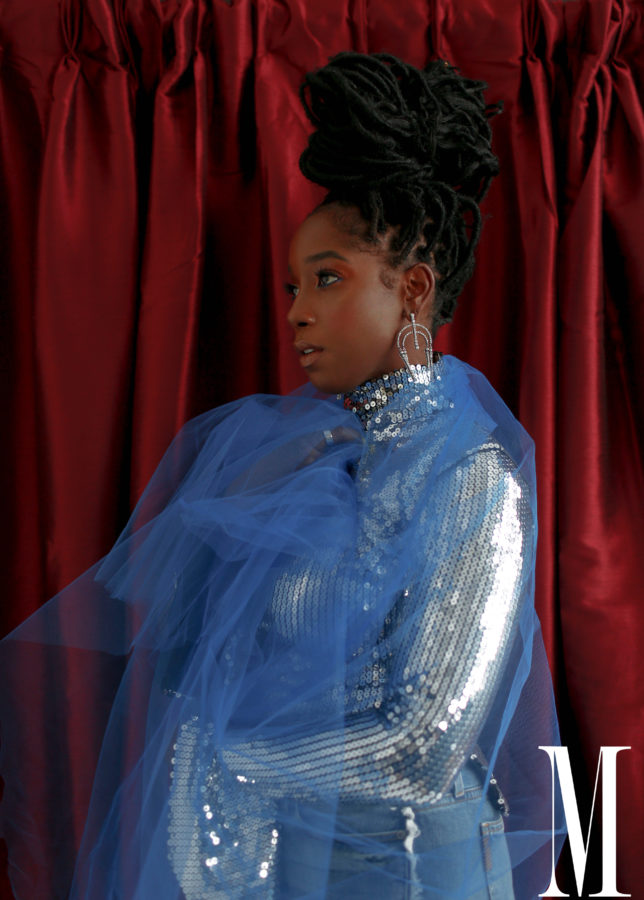
Rings| Left Hand| Clear Ring| Lady Grey Pearl Ring| Chris Habana
Right Hand| Band| Stylist Owned | multi-band ring | Chris Habana
Who is Ashley Blaine Featherson?
“I’m wonderful and very complex. I’m a dreamer and inspiration is my daily fuel. I love my friends and my family and I am so grateful to them. I wouldn’t be where I am today and who I am today without the people who love me every day.”
Be sure to catch Ashley Blaine Featherson on the new season of ‘Dear White People,’ which airs on Netflix this Friday.
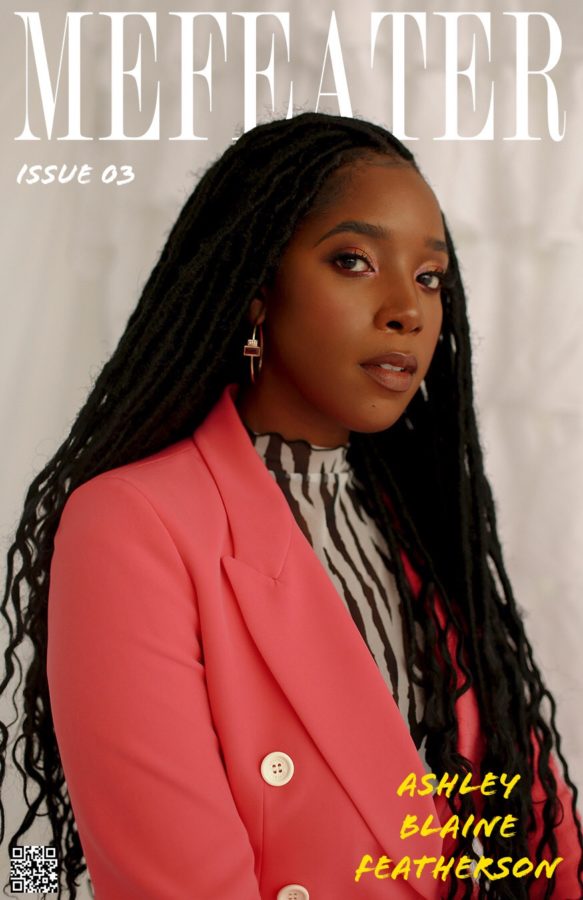
Follow MEFeater on Twitter, Instagram, Facebook and Pinterest for more updates.
This interview has been condensed.
Credits
Executive Producer | Gabrielle Amani
Producer – Creative Director | Kyle Adams
Photographer | Sydney Claire
Prod. Manager | Joni Edwards
Art Director | Animah Danquah
Wardrobe Stylist | Sequine Lee
Makeup Artist | Patrice Pugh
Set Designer | Neya Nixon



